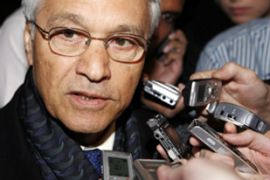Opec agrees on record output cut
Petroleum exporters agree largest ever supply cut, amid global economic slump.

The meeting comes as the price of oil is sliding, leaving it at 70 per cent off their highs of $147 a barrel in July.
Oil demand has dwindled in recession-hit industrialised nations and the cut had been endorsed by many of the group before the meeting in an attempt to stabilise the price.
Abdullah al-Badri, Opec’s secretary-general, said: “We are in harmony, we know the situation is difficult. We have to co-operate together.
“We have to reach a difficult decision, but we’re going to reach it. I think two million is the most likely cut.”
Russia pledge
Russia, the world’s biggest non-Opec exporter, has suggested it could contribute to the curbs, but Mexico has avoided making any commitments.
Russia is also sending its highest-ranking delegation ever to the meeting, including the heads of its five top oil companies.
An overall reduction of 2.6 million bpd would remove about three per cent of the world’s daily output.
“We know that supply is still somewhat in excess of demand, inventories are also higher than normal,” al-Nuaimi said.
| In video | ||
|
|
“Therefore, to bring things in balance there will be a cut of about two million barrels per day at this meeting.”
Chakib Khelil, Opec’s president, has said that the $75 a barrel price target set by King Abdullah, Saudi Arabia’s monarch, was a “fair price”.
Saadallah al-Fathi, an oil analyst based in Dubai, told Al Jazeera: “Raising oil prices will impact a lot of people in the oil-producing countries and make it possible for them to continue with their development and with their investment in the oil industry to provide more oil for the world in the future.
“At the same time they have to be cognisant of the state of the economy in the world, and they have to help the world in getting out of the recession.”
Asked if he thought $75 a barrel was a fair price for oil, he said: “If the price of oil reached $147 per barrel, I think $75 per barrel seems to be a fair price.”
‘Difficult and costly’
In an interview with Al Jazeera on Tuesday, Abdullah bin Hamad al-Attiyah, Qatar’s oil and energy minister, said that Opec’s aim is to balance the demand with the supply.
“If you offer oil and no one is buying it what should you do with it? The oil industry is very difficult and very costly,” he said.
He blamed high oil prices at the pump on mainly Western governments, saying they were not passing on the lower prices to consumers.
“Oil is still very cheap now … but consumers in Europe and other parts of the world are still paying high prices of oil in gas stations because of the tax. Tax in Europe and in other parts of the world is over 85 per cent.”
Opec has cut output twice since September without halting the decline in oil prices which has slashed revenues for the group’s members and raised fears of a future supply crunch as investors pull money from costly exploration and production projects.
